- Women's Research Review
- Posts
- Women's Research Review 3
Women's Research Review 3
It's a good one today, don't miss it
Good afternoon!
We are back with edition 3 of this newsletter, I do hope you’re learning from it!
I have 3 very interesting studies to breakdown for you today, so let’s crack on.
Research #1
"Is Stress and Depression Making You Gain Weight? Study on High-Fat Meals and Metabolic Responses"
A 2015 study investigated how daily stressors and a history of major depressive disorder (MDD) affect obesity-related metabolic responses to high-fat meals. PMID: 25034950
The study involved 58 healthy women with an average age of 53.1 years, including 38 breast cancer survivors and 20 control subjects.
The participants were randomly given either a high-saturated fat meal or a high-oleic sunflower oil meal.
The meals had specific targets for the amount of carbohydrates, fats, and proteins, given as a percentage of the total energy in the meals: 54.9% carbohydrates, 27.6% fats, and 17.6% protein.
The study measured resting energy expenditure (REE), fat and carbohydrate oxidation, triglycerides, cortisol, insulin, and glucose levels before and after the meals.
The Daily Inventory of Stressful Events was used to assess the number of stressors experienced by the participants the day before the study.
RESULTS
The study found that higher numbers of stressors were associated with lower post-meal REE. (Resting Energy Expenditure)
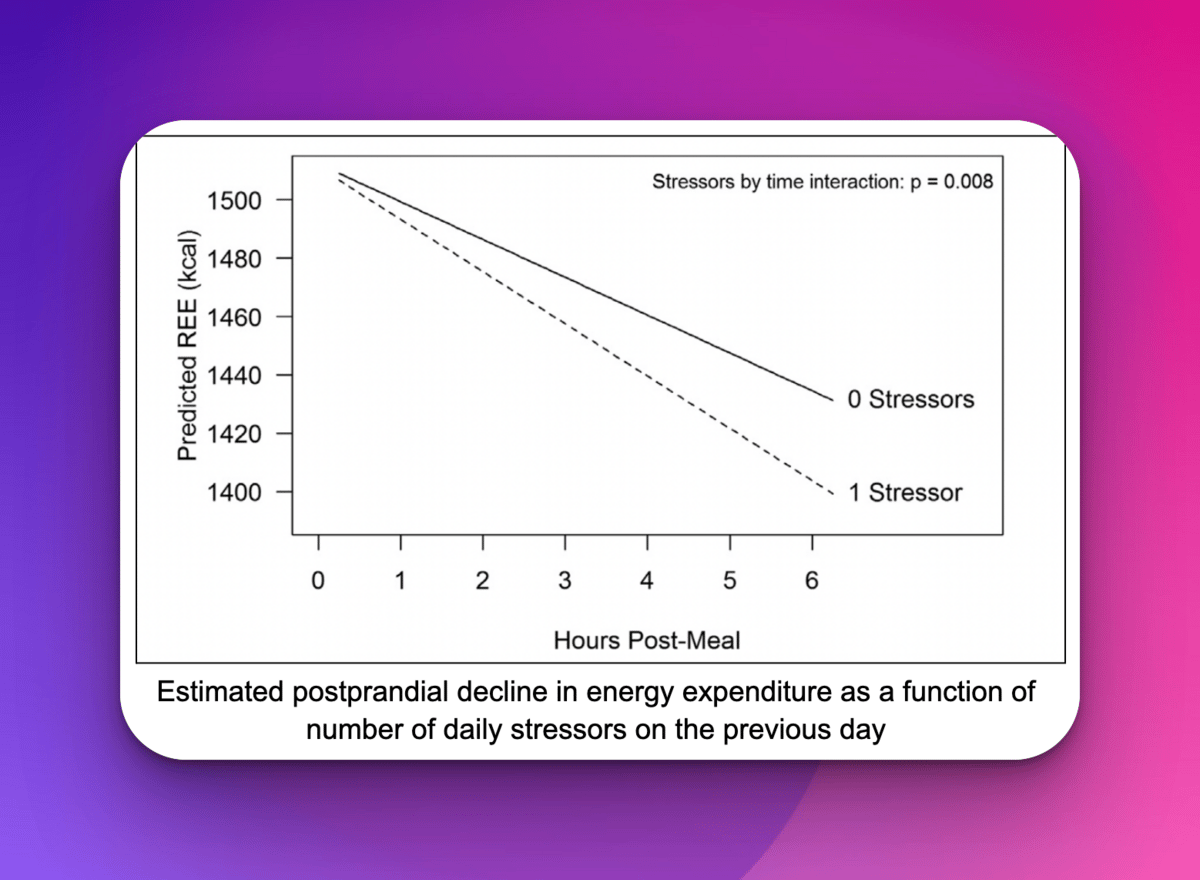
The study also found that higher numbers of stressors were associated with lower fat oxidation and higher insulin, with no significant effects for cortisol and glucose.
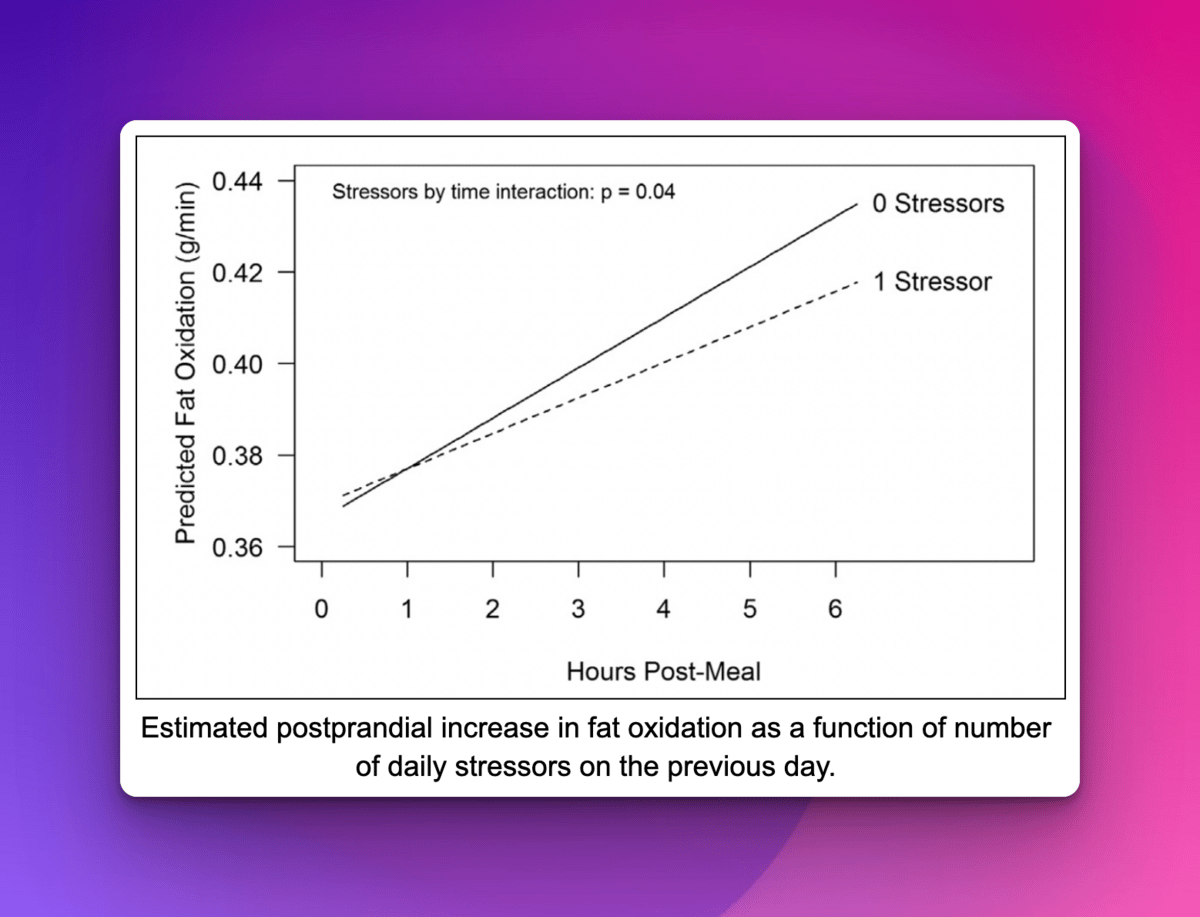
Participants with a history of major depressive disorder (MDD) had higher cortisol (stress hormone) and higher fat oxidation, with no significant effects for REE, insulin, and glucose.
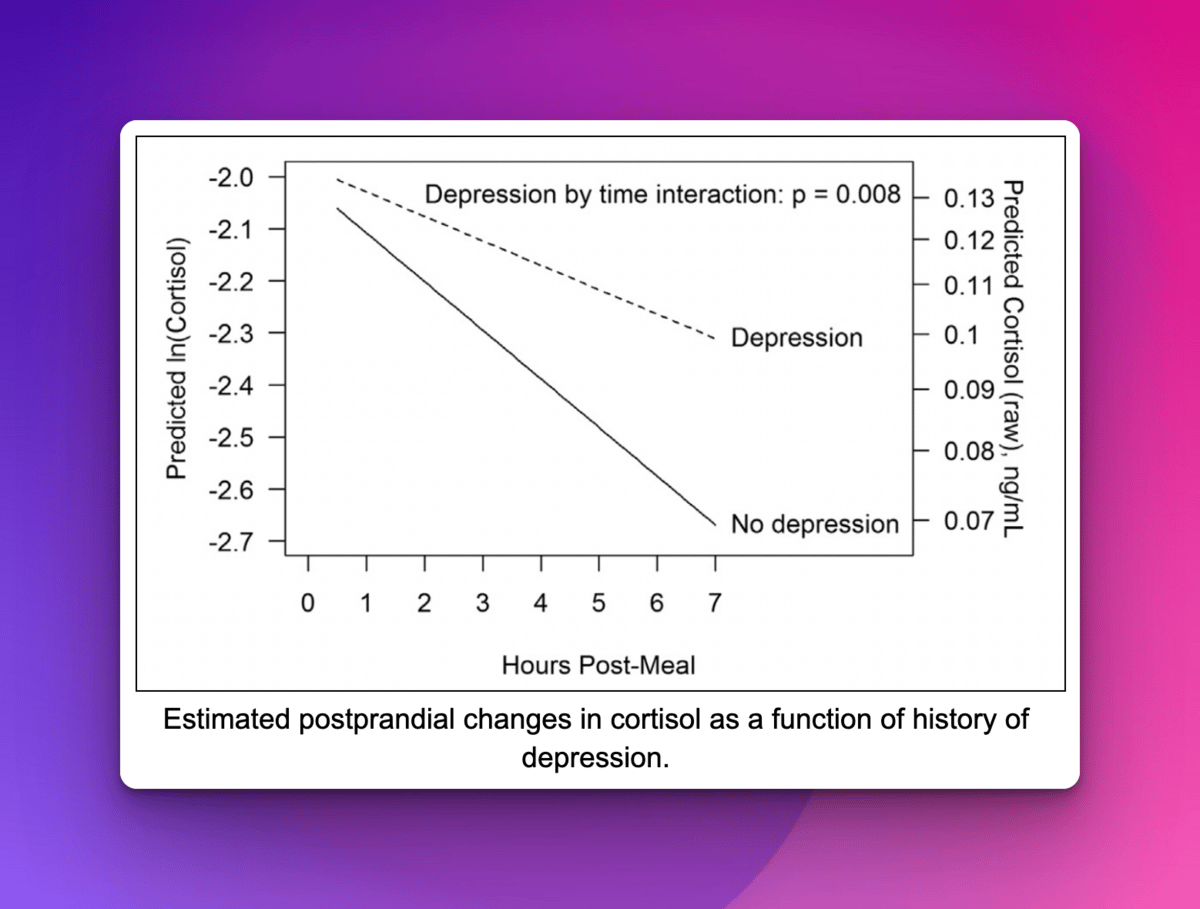
Yeah Scott all cool mate, what can I take away from this?
TAKEAWAY 1
[MORE STRESS = LOWER RESTING ENERGY EXPENDITURE]
Experiencing more stress the day before was associated with burning fewer calories after a meal.
For every stressful event experienced in the previous day, there was a decrease in energy expenditure after a meal.
Difference between experiencing one stressful event in the past 6 hours and experiencing no stressors was equivalent to burning 104 calories less after a meal, on average.
Over the course of a year, this difference in energy expenditure could add up to a weight gain of almost 11 pounds (or 5 kilograms).
TAKEAWAY 2
[MORE STRESS = LOWER FAT OXIDATION & HIGHER INSULIN]
Experiencing more stress the day before was linked to lower levels of fat burning and higher levels of insulin production.
People who have lower levels of fat burning are more likely to store fat, which increases their risk of becoming overweight or obese.
Essentially, the more stress a person experiences, the more likely they are to store fat and gain weight. (in in a surplus of course)
TAKEAWAY 3
[HISTORY OF DEPRESSION = HIGHER CORTISOL LEVEL]
Women with a history of depression had higher levels of cortisol after a meal than women without a similar history.
Cortisol can promote the accumulation of triglycerides (a type of fat) in the visceral fat (fat around organs), which can increase the risk of health problems.
Cortisol does this by binding to glucocorticoid receptors in visceral fat and increasing the activity of an enzyme called lipoprotein lipase, which promotes the accumulation of triglycerides in visceral fat.
Triglycerides = are a type of fat that are stored in the body's fat cells and used for energy.
CONCLUSION
The study concludes that stress and depression can change how the body processes high-fat meals, making it easier to gain weight and become obese.
They also found that the difference in the body's response to high-fat meals between a day with stress and a day without stress adds up to about 104 calories over 6 hours.
-> Over time, this difference in calorie intake could result in almost 11 pounds of weight gain in a year.
REFERENCE
PMID: 25034950
Research #2
Weight loss induces changes in adaptive thermogenesis in female and male physique athletes.
When we lose weight over time, our metabolic rate drops. Typically, before a diet we can use an equation to estimate our total daily energy expenditure with accuracy.
But, the longer you lose weight, the more out of wack this calculation becomes. What the calculation says should be your calories burned per day is less in reality. This is known as metabolic adaption.
Back in the day, people mistook this for “damage”.
Many people claim they can’t lose weight any more because their metabolism has “crashed” and it's now impossible.
Well, this new study sheds some light on the reality of how much it “crashes” aka adapts to weight loss.
Natural female physique competitors were looked at, their body fat % dropped a lot over the time period. So this is looking more at lean women vs overweight, which is important as adaption is more aggressive it seems in leaner women as conditions of being sub 20% can start placing a toll on the body.
So 23 weeks of contest dieting saw a reduction in calories burned vs prediction by 162 cals a day. Significant, but not crazy.
What happens to cause this?
Decline in resting heart rate associated with changes in the autonomic nervous system.
Temporary suppression of the immune system.
Temporary suppression of the reproductive system.
Decreased levels of systemic inflammation.
Repressed mitochondrial oxidative function and protein translation
Main take from this?
If you’re in a deficit, you’ll lose fat. Your metabolism does not crash or get damaged. If you’re not losing weight over time, it's because you’re not in a deficit, not because of your metabolism.
In the most extreme cases, as highlighted above, the estimated maintenance may have been 1600 but in reality it would be minus 162 so 1438.
But this is in very lean individuals, for most of us, normal people, we would see less of a difference there. Say at best it would be 100 calories lower than predicted.
But if we’re in a 500 cal deficit, this shouldn’t impact results.
So the next time you think your metabolism is damaged, question that assumption, and it’s likely your tracking isn’t accurate, or you may have the wrong target.
Research #3
Fact or Fiction: Do Men and Women Really Have the Same Protein Needs?
Many studies that have explored the amounts of protein needed to achieve maximum protein balance after resistance training has focused on men.
Therefore, a 2018 study aimed to determine the optimal protein intake for strength-trained women after exercise to maximise muscle growth and minimise protein breakdown. PMID: 30395050
The researchers hypothesised that the optimal protein intake for women to achieve maximum muscle growth after weightlifting would be lower than the established 1.7 grams per kg of body weight per day for men.
They also hypothesised that the ideal protein intake for women would fall within the American College of Sports Medicine's recommended range of 1.2-2.0 grams per kilogram of body weight per day.
[70 kg weight = 84-140 g of protein]
EXPERIMENT
8 resistance-trained women who have a regular menstrual cycle and had been lifting for at least 1 year participated in the study. Their average age was 23 years, and their average body weight was 67 kg.
To participate in the study, the women could not be taking hormonal contraceptives, and they needed to bench press at least 0.7x bodyweight and leg press at least 2.3x bodyweight.
The subjects followed a controlled diet for 2 days [1.2g/kg/day of protein and 4g/kg/day of carbohydrate] before performing a full-body workout. The subjects were also familiarised with the resistance training protocol for the study
They completed 6-7 “metabolic trials.” 2 days prior to testing, the women completed a standardised workout consisting of 4 sets of 8-10 reps for all exercises with 90 seconds of rest between sets listed below:
barbell bench press
lat pull-down
barbell overhead press
seated cable row
leg press
knee extensions
On the testing day, the women consumed a protein-free carbohydrate beverage for breakfast, 1 hour prior to their exercise session.
During the recovery period after exercise, the women consumed eight hourly meals, each with a different amount of protein (ranging from 0.2 to 2.9 g of protein per kilogram of body weight per day).
The protein was in the form of crystalline amino acids which has an amino acid profile mirroring egg protein
Breath, and urine samples were collected to measure rates of phenylalanine to measure urinary urea and creatinine in order to calculate rates of protein synthesis, oxidation, and excretion.
The trials all took place during the luteal phase of the menstrual cycle, the subjects completed their 6-7 metabolic trials on an average of 86 days.
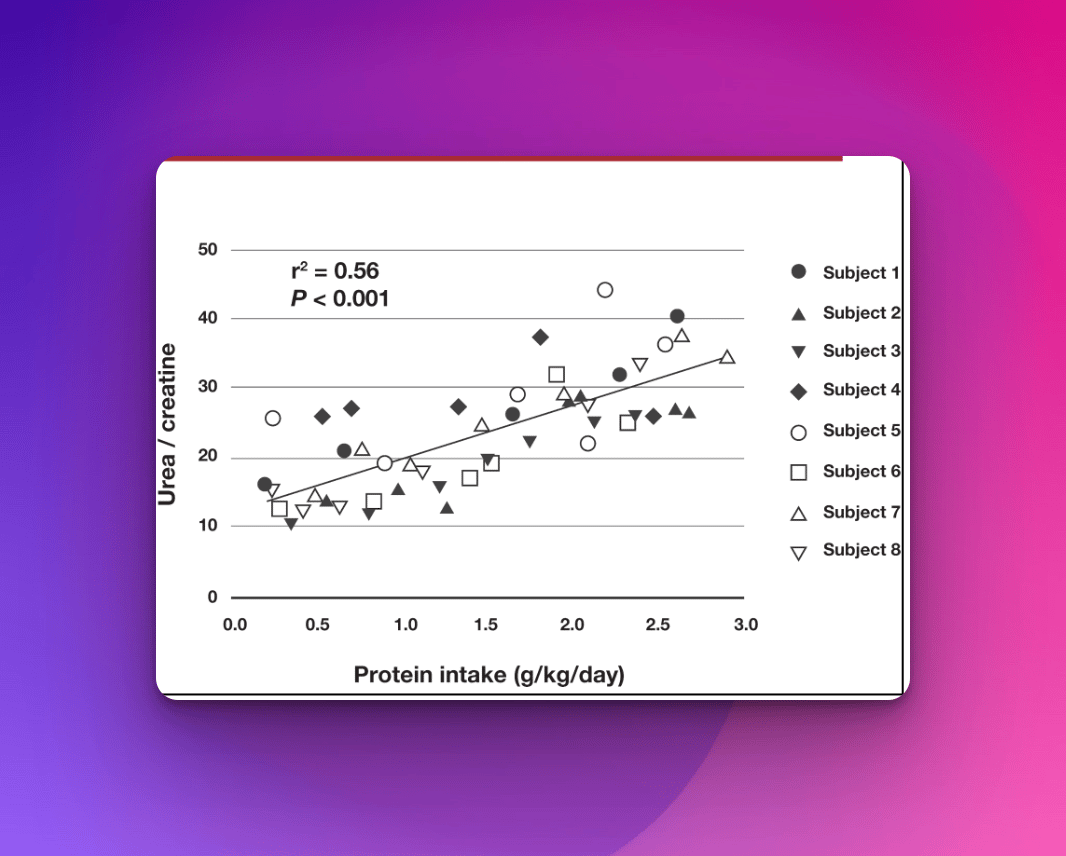
The results found the urinary urea to urinary creatinine ratio increases with higher protein intake, indicating greater protein breakdown and excretion.
Take note:
Excess protein can be converted to glucose for energy production, excreted through urine, or stored as fat in the body.
RESULTS
Up to an average intake of 1.53g/kg/day, protein synthesis increased faster than protein oxidation. After this point, protein synthesis and oxidation increased at similar rates, leading to no further change in net protein balance.
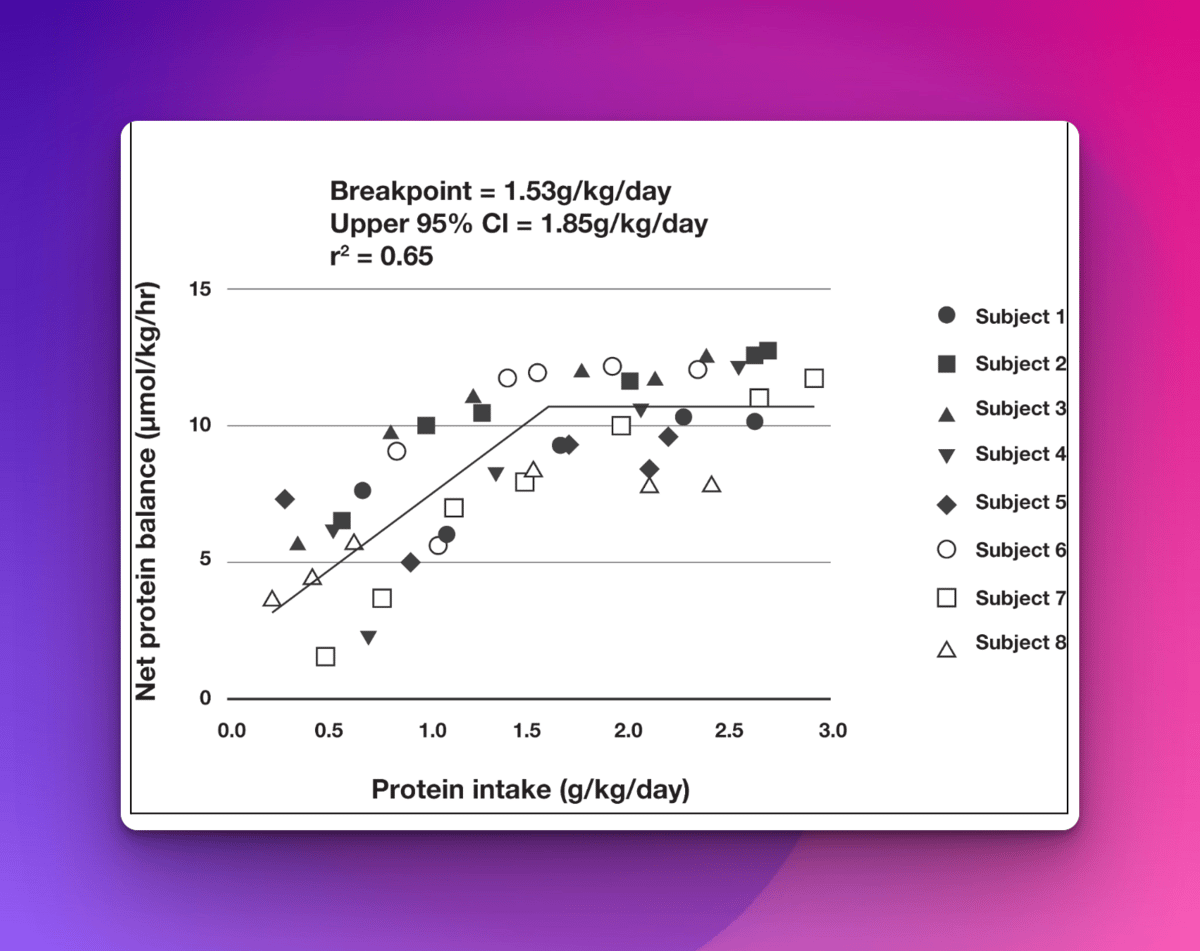
The results showed that the optimal protein intake to maximise muscle growth was 1.49-1.53 grams of protein per kilogram of body weight per day. [70 kg = 104 - 107 g of protein].
NEXT STEPS
The protein requirements for men and women are similar, but men may need a little more due to having a higher proportion of lean body mass.
To meet their protein requirements, women should aim to consume around 1.5-1.9g of protein per kilogram of body weight per day, which is approximately 0.7-0.9g per pound of body weight per day, while maintaining their caloric intake.
Take Note: women in this study were purposefully kept at caloric maintenance. Protein requirements for women, like men, are likely higher when in a calorie deficit. REFERENCE: PMID: 30395050
The End
Hopefully you found this useful with some practical takeaways.
Remember: Our biggest challenge of the year starts on March 13th! The details can be found below
Have a great day, see you next week!
